nossos filmes
No Comments
By Tangerina
On 11, Mar 2019 | No Comments | In documentaries series television | By Tangerina
The Protagonists
The Protagonists is a 13-episode series that tells the Brazilian audiovisual history from the perspective of female filmmakers’ works, from 1931’s film “O Caso do Dominó Preto” (“The Mystery of the Black Domino”) by Cléo de Verberena until 2019. Tangerina Entretenimento is behind the production, which will be premiering on Cine Brasil TV channel in 2020.
Throughout the series, the narrative uses excerpts from films and audiovisual works, documents, photos, newspaper clippings, and statements by authors and researchers to tell the path of more than 70 filmmakers such asAdélia Sampaio, Helena Ignez, Helena Solberg, Sandra Kogut, Letícia Parente, Ana Maria Magalhães,Tizuka Yamasaki, Suzana Amaral, Lucia Mural, Eliana Fonseca, Ana Luiza Azevedo, Laís Bodanzky, Anna Muylaert, Kátia Lund, Maria Augusta Ramos, Flávia Castro, Tereza Trautman Yasmin Thainá, Graci Guarani, Julia Rezende and many other women in film and the audiovisual production.
-
uma produção Tangerina Entretenimento
exibição em breve no CINEBRASiLTV
série de TV documental de 13 episódios
26 min por episódio
-
direção e narração Tata Amaral
argumento Tata Amaral / Caru Alves de Souza / Eliana Natividade / Henrique Figueiredo
roteiro Tata Amaral / Josefina Trotta / Pedro Riera / Eliana Natividade
coordenação de pesquisa Eloá Chouzal
fotografia André Lorenz Michiles / Camila Freitas
direção de arte Vera Hamburguer
música André Whoong
som direto João Godoy / Juliana Santana / Marina D’Ávila / João Vitor Muçouçah
supervisão de som e mixagem Pedro Noizyman
edição de som Sandro Della Costa / Rosana Stefanoni
supervisão de montagem Willem Dias, AMC
montagem Beatriz Pomar / Lia Kulakauskas
animação Átila Fragoso
ilustração Renoir Santos
prólogo Átila Fragoso / Renoir Santos
coordenação executiva Sonia Hamburguer
produção geral Giselle Bossi
preparação de Tata Amaral Madalena Bernardes
figurino Joana Porto
maquiagem Evelyn Barbieri
camareira Neide Machado
supervisão de finalização Thais Morresi
-
Em breve
-
Clipping
-
Sinopses dos episódios e galeria de fotos
- Episódio 1
- Episódio 2
- Episódio 3
- Episódio 4
- Episódio 5
- Episódio 6
- Episódio 7
- Episódio 8
- Episódio 9
- Episódio 10
- Episódio 11
- Episódio 12
- Episódio 13
-
Episode 1
Pioneers!
In the first decades of the 20th century, world cinema reserved a single function for women: as actresses. Who were the first Brazilian female filmmakers who dared to go behind the camera, taking the authorship of the stories and changing the representation of women on screens? This episode brings the stories of Cléo de Verberena, the only Latin American filmmaker of the silent era; Carmen Santos, actress, producer and director, as well as a top entrepreneur for Brazilian film and culture; and Gilda de Abreu, who conquered the biggest box office of Brazilian cinema until the 1970s.
Alice Guy-Blanché, Cléo de Verberena, Carmem Santos e Gilda Santos
-
Episode 2
Where are the women?
In the post-war period, the project for the industrialization of Brazilian cinema took shape with the creation of studios such as Cinédia, Atlântida and Vera Cruz. Film activity was professionalized along the lines of Hollywood, but in the film crews, only two functions were reserved for women: continuity supervisor and chambermaid. Maria Basaglia, a young filmmaker coming from Italy, broke through this barrier and took over the direction (and production) of films. Apart from her, the episode also discusses the life and work of Zélia Costa and Sonia Shaw, whose films today are missing, and Aurora Duarte, an actress-producer who won a pre-nomination for the Oscars.
Com Maximo Barro
-
Episode 3
The authors
In the vibrant 1960s, the idea of transformation was in the air all over the world. In Brazil, Cinema Novo sought its own dramaturgy. The 1964 military coup and the AI-5 decree in 1968 imposed a domain of repression, but did not completely interrupt the creative flow. The episode brings female filmmakers who faced this hostile environment and created an original cinematography, beyond commercial cinema and Cinema Novo: Adélia Sampaio, Helena Ignez, Helena Solberg, Lygia Pape and Ana Carolina.
Com Adélia Sampaio, Ana Carolina Teixeira Soares, Ana Maria Veiga, Helena Ignez, Helena Solberg e Heloísa Buarque de Hollanda
-
Episode 4
They change the game
In the 1970s, women took over the screen in a profession so far dominated by men. In this key decade for the advancement of women’s rights, they made more than 200 films, including shorts, art videos and feature films. Female directors challenged the military regime and the macho environment, and took a chance exposing their sexuality and their visions. Some of these films transcended small circuits and were exhibited in commercial theaters. This was the case of Tereza Trautman’s film “Os Homens que Eu Tive” (“The Men I Had”), which had a successful career until it was removed from theaters by censorship.
Com Ana Maria Veiga, Heloisa Buarque de Hollanda, Rose Lacreta e Tereza Trautman
Em homenagem a Leilany Fernandes e Maria do Rosário Nascimento e Silva
-
Episode 5
Pioneers of video art, an author & actress, a filmmaker in Boca do Lixo
As the political scene became increasingly repressive in the 1970s, women’s bodies were more exposed than ever. One of the most powerful responses to this came from video artist Letícia Parente and her work “Made in Brazil”. Many other filmmakers began to question the figure of women as sexual objects. Female presence and themes stood out in video art with names like Anna Bella Geiger and Regina Vater. Co-founder of the Belair film production company Helena Ignez created transgressive female characters. Rosangela Maldonado was one of the few female directors at Boca do Lixo. These women’s production brought new ways of looking and representing the female body.
Com Solange Farkas, Sonia Andrade e Helena Ignez
-
Episode 6
Feminisms
From the mid-1970s, driven by feminist struggles around the world, Brazilian filmmakers began to produce and discuss their role as artists and professionals. Helena Solberg created the collective International Women Film Project in New York with the aim of making militant films on women’s condition and work. The films directed by Solberg, Vera Figueiredo, Olga Futemma, Ana Maria Magalhães, Ana Carolina, among others, show us that there is not only ”feminism”, but “feminisms”. These filmmakers created unusual, not stereotypical female characters.
Com Ana Carolina Teixeira Soares, Ana Maria Magalhães, Ana Maria Veiga, Helena Solberg, Heloísa Buarque de Hollanda, Olga Futema e Vera Figueiredo
-
Episode 7
They make it into the theaters and become top hits!
In the late 1970s and early 1980s, filmmakers such as Tizuka Yamasaki, Adélia Sampaio, Suzana Amaral and Lúcia Murat made it into commercial theaters and became top hits. Their films mark the era of political opening and redemocratization in Brazil after the years of military dictatorship. They defied moralism and disbelief, they exposed the regime’s torture and they innovated in form. Recognized by critics and selected in national and international festivals, they reached a wide Brazilian audience.
Com Adélia Sampaio, Assumpção Hernandes, Lucia Murat, Suzana Amaral e Tizuka Yamasaki
-
Episode 8
They show the face of Brazil
The early 1980s were characterized by the struggle for better living conditions. Strikes and demonstrations returned to the streets after two decades of repression. With the arrival of video and 16mm cameras, in addition to the creation of new channels of exhibition and distribution, filmmakers and videographers documented people’s living conditions, situations of prejudice and resurgence of social movements. Protagonists of this episode include Rita Moreira, Tetê Moraes, Lucila Meirelles, Inês Castilho, and Sandra Kogut, who, by the end of the decade, revolutionized the language of video.
Com Inês Castilho, Lucila Meirelles, Sandra Kogut, Solange Farkas e Tete Moraes
Em homenagem a Berenice Mendes, Cida Aidar, Maria Rita Kehl e Raquerl Gerber
-
Episode 9
The spring of the short film
In the mid-1980s, short films took the theaters, opening the screenings of feature films in all major cities in the country, thanks to the so-called “Lei do Curta” (“Short Film Law”). This brings an unprecedented dialogue between the public and a new generation of filmmakers, whose innovation had been recognized nationally and internationally. The production of short films required the creation of new circuits for exhibition and distribution, and new models of production and exhibition for the format. The creation of the São Paulo International Short Film Festival was a milestone.
Com Ana Luiza Azevedo, Anna Muylaert, Eliana Fonseca, Laís Bodanzky e Zita Carvalhosa
-
Episode 10
They promote the “Retomada”
With the extinction of national film company Embrafilme in 1990 by President Fernando Collor de Mello and a rampant inflation, Brazilian feature film basically ceased to exist. Tizuka Yamasaki conquered one of the biggest box offices of the decade with “Lua de Cristal” (“Xuxa in Crystal Moon”), starring TV host Xuxa. In 1995, Carla Camurati released “Carlota Joaquina, Princesa do Brasil” (“Carlota Joaquina, Princess of Brazil”), which represents the reconciliation of Brazilian cinema with its audience and the beginning of the period known as “Retomada”, or “Brazilian cinema retaken”. New laws encouraging production and diffusion were created, but this time without control or censorship by the military dictatorship, and a new generation of filmmakers, such as Laís Bodanzky, Eliane Caffé, Anna Muylaert, Tata Amaral, among others, was allowed to emerge.
Com Carla Camurati, Laís Bodanzky e Tizuka Yamasaki
-
Episode 11
They occupy all media
The 2000s bring big news such as Kátia Lund’s projects, which develop in more than one language: video clips, films, TV series. Many filmmakers found in the documentary a possibility for autobiographical construction. Flávia de Castro is one of them: while seeking the reasons for her father’s death, she discloses the country’s most recent history. Documentary’s authorial potentials were also explored by filmmaker Maria Augusta Ramos, whose films reached international audiences and carved her name among the world’s great documentary filmmakers.
Com Kátia Lund, Flávia Castro e Maria Augusta Ramos
-
Episode 12
They have arrived
At the beginning of the 21st century, Brazil had changed. Through public programs, thousands of low-income students were able to enter universities. A film made by a woman discusses the great social structures triggered by this moment: Anna Muylaert’s “Que Horas Ela Volta?” (“The Second Mother”). The changes also happen in the audiovisual scenario. Among other movements, the “uprising of black cinema” in 2014 was mainly carried out by women. Julia Katharine, the first trans filmmaker, starts producing. These, and other trajectories, such as Viviane Ferreira, Yasmin Tayná, Danddara and Adélia Sampaio’s, show that big parts of the population, silenced until then, gained a voice.
Com Adélia Sampaio, Anna Muylaert, Danddara, Janaína Oliveira, Julia Katharine e Viviane Ferreira
-
Episode 13
All tribes
With new promotion laws, the 2010’s witness a strong presence of female directors on television. Brazil has seen a successful cycle of production and distribution, with box office hits, television audience records and international awards. Diversity is also a hallmark of the decade: indigenous filmmakers Graci Guarani, Patricia Ferreira and Sophia Pinheiro use audiovisual expressions for their own culture. Eliane Caffé directs “Era o Hotel Cambridge” (“The Cambridge Squatter”) in collaboration with homeless movements. This thriving trajectory, however, was threatened in 2019, when the quota for Brazilian films in national theaters ceased to be in force. This caused the successful “De Pernas pro Ar 3” (“Head Over Heels 3”), directed by Julia Rezende, to be replaced in theaters by a foreign film.
Com Debora Ivanov, Graciela Guarani, Eliane Caffé, Julia Rezende, Mariza Leão e Vera Zaverecha



























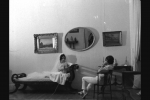




























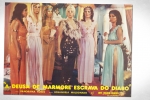
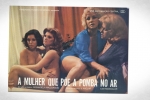












































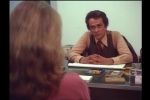
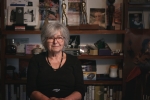









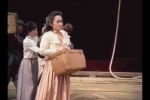





































































































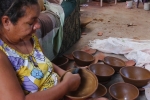
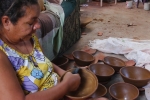
Submit a Comment